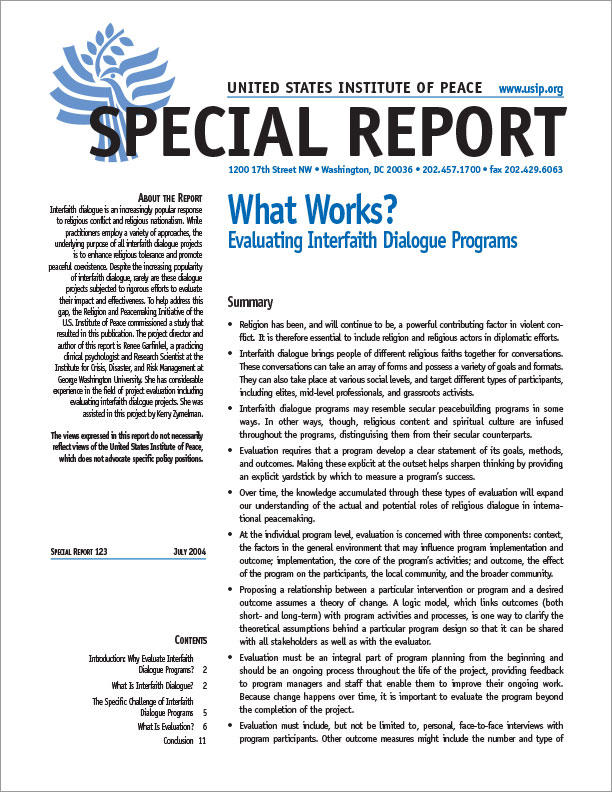What Works? Evaluating Interfaith Dialogue Programs

Summary
- Religion has been, and will continue to be, a powerful contributing factor in violent conflict. It is therefore essential to include religion and religious actors in diplomatic efforts.
- Interfaith dialogue brings people of different religious faiths together for conversations. These conversations can take an array of forms and possess a variety of goals and formats. They can also take place at various social levels, and target different types of participants, including elites, mid-level professionals, and grassroots activists.
- Interfaith dialogue programs may resemble secular peacebuilding programs in some ways. In other ways, though, religious content and spiritual culture are infused throughout the programs, distinguishing them from their secular counterparts.
- Evaluation requires that a program develop a clear statement of its goals, methods, and outcomes. Making these explicit at the outset helps sharpen thinking by providing an explicit yardstick by which to measure a program's success.
- Over time, the knowledge accumulated through these types of evaluation will expand our understanding of the actual and potential roles of religious dialogue in international peacemaking.
- At the individual program level, evaluation is concerned with three components: context, the factors in the general environment that may influence program implementation and outcome; implementation, the core of the program's activities; and outcome, the effect of the program on the participants, the local community, and the broader community.
- Proposing a relationship between a particular intervention or program and a desired outcome assumes a theory of change. A logic model, which links outcomes (both short- and long-term) with program activities and processes, is one way to clarify the theoretical assumptions behind a particular program design so that it can be shared with all stakeholders as well as with the evaluator.
- Evaluation must be an integral part of program planning from the beginning and should be an ongoing process throughout the life of the project, providing feedback to program managers and staff that enable them to improve their ongoing work. Because change happens over time, it is important to evaluate the program beyond the completion of the project.
- Evaluation must include, but not be limited to, personal, face-to-face interviews with program participants. Other outcome measures might include the number and type of participants, program spin-offs, and post-program meetings, as well as the amount of media activity and ultimately, of course, a demonstrable reduction in violence.
About the Report
Interfaith dialogue is an increasingly popular response to religious conflict and religious nationalism. While practitioners employ a variety of approaches, the underlying purpose of all interfaith dialogue projects is to enhance religious tolerance and promote peaceful coexistence. Despite the increasing popularity of interfaith dialogue, rarely are these dialogue projects subjected to rigorous efforts to evaluate their impact and effectiveness. To help address this gap, the Religion and Peacemaking Initiative of the U.S. Institute of Peace commissioned a study that resulted in this publication. The project director and author of this report is Renee Garfinkel, a practicing clinical psychologist and Research Scientist at the Institute for Crisis, Disaster, and Risk Management at George Washington University. She has considerable experience in the field of project evaluation including evaluating interfaith dialogue projects. She was assisted in this project by Kerry Zymelman.
The views expressed in this report do not necessarily reflect views of the United States Institute of Peace, which does not advocate specific policy positions.



